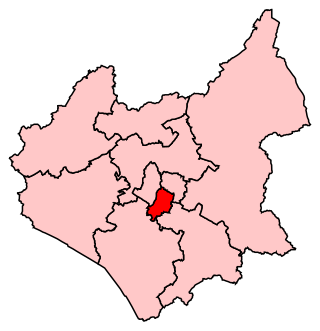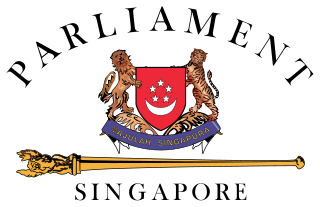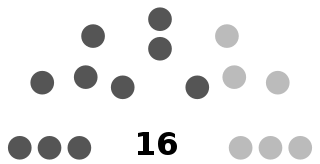
The politics of Nauru take place in a framework of a parliamentary representative democratic republic, whereby the President of Nauru is the head of government of the executive branch. Legislative power is vested in both the government and the parliament. The Judiciary is independent of the executive and the legislature.

The 1987 New Zealand general election was a nationwide vote to determine the shape of the 42nd sitting of the New Zealand Parliament. The governing New Zealand Labour Party, led by Prime Minister David Lange, was re-elected for a second term, although the Opposition National Party made gains. The election also saw the elimination of the Democratic Party from Parliament, leaving Labour and National as the only parties represented.

The 1996 New Zealand general election was held on 12 October 1996 to determine the composition of the 45th New Zealand Parliament. It was notable for being the first election to be held under the new mixed-member proportional (MMP) electoral system, and produced a parliament considerably more diverse than previous elections. Under the new MMP system, 65 members were elected in single-member districts by first-past-the-post voting, while a further 55 "top-up" members were allocated from closed lists to achieve a proportional distribution based on each party's share of the nationwide party vote.

Leicester South is a constituency, recreated in 1974, represented in the House of Commons of the UK Parliament since 2011 by Jonathan Ashworth of the Labour Co-op Party. A previous version of the seat existed between 1918 and 1950. Except for a 2004 by-election when it was won by the Liberal Democrats, Leicester South has been held by the Labour Party since 1987.

The single-chamber Parliament of Georgia has 150 members, elected for a four-year term through elections. The last presidential elections were held in October 2018 due to constitutional changes taking effect in 2024, after which the president will be elected for a five-year term by a parliamentary college of electors. The series of constitutional changes, initiated in 2017, stipulated a one-time transitional presidential term of six years for 2018–2024. Other major systemic changes included a move to a fully proportional system by 2024 with a 5% threshold.

Elections in Niger take place within the framework of a semi-presidential system. The President and National Assembly are elected by the public, with elections organised by the Independent National Electoral Commission (CENI).

Orkney and Shetland is a constituency of the House of Commons of the Parliament of the United Kingdom. It elects one Member of Parliament (MP) by the first past the post system of election. In the Scottish Parliament, Orkney and Shetland are separate constituencies. The constituency was historically known as Orkney and Zetland.

The Parliament of Singapore is the unicameral legislature of the Republic of Singapore, which governs the country alongside the president of Singapore. Largely based upon the Westminster system, the Parliament is made up of Members of Parliament (MPs) who are elected, as well as Non-constituency Members of Parliament (NCMPs) and Nominated Members of Parliament (NMPs) who are appointed. Following the 2020 general election, 93 MPs and two NCMPs from three political parties were elected to the 14th Parliament. Throughout the sitting of Parliament, nine NMPs are usually appointed by the president on a biennial basis.

County Carlow was a parliamentary constituency in Ireland, which from 1801 to 1885 returned two Members of Parliament (MPs) to the House of Commons of the United Kingdom, and one MP from 1885 to 1922.
Oxford University was a university constituency electing two members to the British House of Commons, from 1603 to 1950. The last two members to represent Oxford University when it was abolished were A. P. Herbert and Arthur Salter.

The Parliament of Tuvalu is the unicameral national legislature of Tuvalu. The place at which the parliament sits is called the Vaiaku maneapa. The maneapa on each island is an open meeting place where the chiefs and elders deliberate and make decisions.

Scottish Westminster constituencies were Scottish constituencies of the House of Commons of the Parliament of Great Britain, normally at the Palace of Westminster, from 1708 to 1801, and have been constituencies of the House of Commons of the Parliament of the United Kingdom, also at Westminster, since 1801. Constituency boundaries have changed on various occasions, and are now subject to both periodical and ad hoc reviews of the Boundary Commission for Scotland.

Parliamentary elections were held in Finland on 18 March 2007. Early voting was possible from the 7–13 March. The 200 members of the Eduskunta were elected from 15 constituencies.

Rodney was a New Zealand parliamentary electorate, returning one Member of Parliament to the House of Representatives. The last MP for Rodney was Mark Mitchell of the National Party. He held this position from 2011 until the electorate was replaced with Whangaparāoa in 2020. Mitchell stood for and won that seat.

Parliamentary elections were held in Belarus on 14 May 1995 to elect the thirteenth Supreme Council. The elections took place alongside a multi-question referendum, although several further rounds of voting were required on 28 May, 29 November and 10 December. The majority of candidates elected were independents, although 62 seats remained unfilled due to insufficient voter turnout. A total of 2,348 candidates and 22 parties contested the election, around a thousand of which were independents. After the planned two rounds, only 119 of the 260 seats had been filled due to turnouts being too low in some areas. As this was well short of the 174 needed for a quorum, an additional two rounds were necessary. By the fourth round a quorum was reached, and although further rounds of voting were planned for 1996 to fill the remaining seats, following the constitutional amendments made following the referendum and the subsequent formation of a new National Assembly, they were not held.
Members of the New South Wales Legislative Assembly who served in the 55th parliament held their seats from 2011 to 2015. They were elected at the 2011 state election and at by-elections. The Speaker was Shelley Hancock.

Parliamentary elections were held in Nauru on 23 January 1971. As there were no political parties, all candidates ran as independents. Following the election, Hammer DeRoburt was re-elected president by members of the Parliament.

The 30th New Zealand Parliament was a term of the New Zealand Parliament. It was elected at the 1951 general election on 1 September of that year.

The 36th New Zealand Parliament was a term of the New Zealand Parliament. It was elected at the 1969 general election on 29 November of that year.















